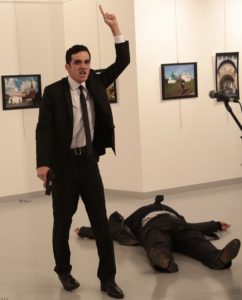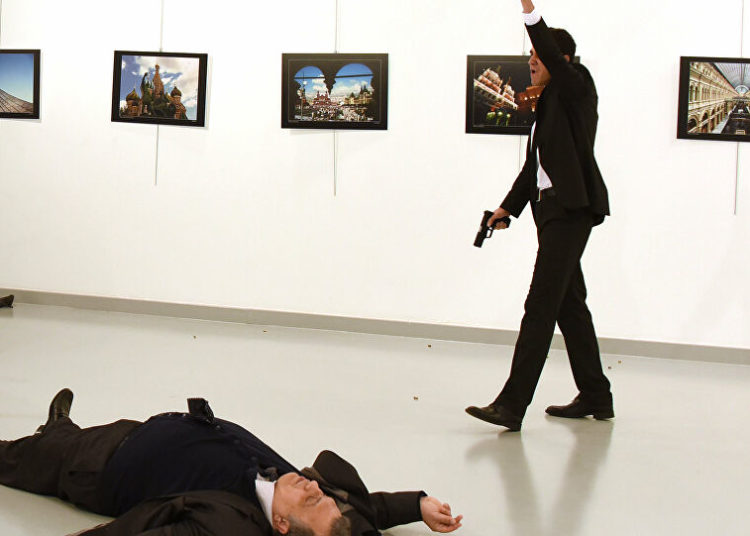Abdullah Bozkurt/Stockholm
Turkey rejected the Russian government’s urgent request not to conduct an autopsy on the body of slain Russian Ambassador Andrei Karlov, who was gunned down by a Turkish police officer linked to jihadist groups that are under the protection of President Recep Tayyip Erdoğan’s Islamist government.
According to an internal government communiqué obtained by Nordic Monitor, the Russian Embassy sent an urgent diplomatic note to the Turkish Foreign Ministry on December 20, 2016, a day after the Russian envoy’s assassination. The note stated that the ambassador’s grieving widow, Marina Mihaylovna Karlova, married to him for 45 years, did not want a Turkish medical examiner to perform the autopsy on her husband’s body, signaling that the Russian government wanted to keep the body intact and take the first look at it as part of its own investigation.
The Russians apparently did not trust Turkish investigators and were concerned about evidence tampering. They wanted to retrieve the ambassador’s body to perform the autopsy in Russia and make their own assessment on how he was murdered and what ammunition was used in the assassination.
The Turkish Foreign Ministry’s General Directorate on the Caucasus, Middle East and Eastern Europe dispatched the Russian Embassy’s note under the most urgent code (YILDIRIM) to the Ministry of Justice and the Ankara Chief Public Prosecutor’s Office, which was investigating the incident. The letter, signed electronically on behalf of the foreign minister, recommended that the Russian request be honored.
“Considering the request of the ambassador’s wife, which was conveyed via the diplomatic note, and the possibility that the autopsy will be performed by authorities in the Russian Federation, it is considered appropriate not to perform an autopsy on Ambassador Karlov in our country,” the letter stated.
Turkish Foreign Ministry’s letter that transmitted the Russian diplomatic note under an urgent code to the Ankara Chief Public Prosecutor’s Office:
However, the Turkish authorities did not agree with the assessment and decided to reject the Russian government’s request. The ambassador’s body, first taken to the Private Ankara Güven Hospital from the crime scene, was sent to the Council of Forensic Medicine in Ankara.
Turkey’s refusal came after Russian Embassy officials observed the preliminary assessment made by Turkish officials at the hospital, where the envoy was declared dead on arrival. The initial examination done at 21:30 in the morgue was attended by prosecutor Ali Alper Saylan, his clerk Serkan Saray, medical doctor Servet Birgin İritaş and hospital employee İsmail Alıç.
From the Russian Embassy First Secretary Anton Skvortsov and Deputy Chief of Staff Dmitry Baranov observed the initial examination. Both diplomats know Turkish, and no translator was requested according to the record written by the prosecutor’s office.
The initial examination was completed at 10 past midnight with the medical examiner’s recommendation for a more detailed autopsy on the ambassador’s body, which was approved by the prosecutor on the scene.
However, a few hours after this decision, the Russian Embassy sent an urgent diplomatic note asking the Turkish authorities to refrain from performing the autopsy. The Turks balked at the Russian request.
A three-page report by the prosecutor’s office on the initial examination, which was observed by two Russian diplomats:
The detailed autopsy, done despite objections from the Russians, stated that Karlov died as a result of multiple gunshot wounds that caused fatal damage to the heart, lungs and spinal cord, resulting in severe massive internal and external bleeding and traumatic shock. The gunman put six bullets in Karlov’s head, neck, back, abdomen, chest and midriff. Only one bullet was recovered from his body, while the others went through. He was dead within five minutes of the shooting.
The Russian authorities’ request that Turkey not perform an autopsy reflects mistrust by Russia on the handling of the investigation by the government of President Erdoğan. It turned out that Russians were right as the Erdogan government managed to derail the investigation, protected radical imams, some on the government payroll, from prosecution and blamed the murder on the Gülen movement, a group critical of the Erdoğan government.

Turkey also turned down a Russian government request to run a lie detector test on a key suspect whom Turkey claimed to be complicit in the assassination. The rejection by Turkey came despite the fact that the suspect, Mustafa Timur Özkan, who repeatedly said he had nothing to do with the murder, volunteered to undergo the Russian government’s lie detector test, eager to prove his innocence.
“The Russians want to hook you up to a lie detector, but I’m not giving you to them,” said public prosecutor Adem Akıncı when interrogating Özkan, a 64-year-old retired architect and avid traveler. “I told him I wouldn’t hesitate to take a lie detector test and that if it was OK with him, I’d volunteer to get hooked up to it.” Özkan recalled of his conversation with the prosecutor.
Private Ankara Güven Hospital report, time stamped at 20:24 hours on December 19, 2016 showed that the ambassador was already dead when he was brought to the hospital. The document did not include the name of the doctor who made the call:
Özkan was the organizer of the art exhibition at which the Russian envoy was assassinated by al-Qaeda-linked police officer Mevlüt Mert Altıntaş on December 19, 2016.
The evidence collected during the course of the investigation portrayed a radicalized police officer who wanted to quit his job to go to Syria to fight alongside jihadists and had been in contact with radical Turkish government imams and al-Qaeda-linked groups as well as President Erdogan’s family cleric Nurettin Yıldız, a radical preacher who openly endorsed armed jihad and frequently attacked Russia in his fiery sermons.
Russian Ambassador Andrei Karlov’s autopsy report:
The Turkish prosecutor ignored all these leads; did not indict any radical figures who had been in contact with the assassin in the months leading up to the assassination; and deliberately deflected the focus of the probe away from people close to the Erdoğan government. Instead, the Gülen movement and others were scapegoated with no evidence presented by the prosecutor to support the allegations.
There are a number of pieces of evidence in the case file that show the killer was in fact radicalized by jihadist literature, attended prayer circles organized by pro-government jihadist cleric Yıldız and had been befriended by known al-Qaeda militants. However, the government did not pursue the leads into jihadist networks and did not investigate the al-Qaeda figures who had worked with the killer. It was also revealed that the Erdoğan government rewarded the killer with 34 bonuses in two years’ time.
The trial concluded in March 2021 with the conviction of scapegoats. The real culprits who helped the assassin radicalize remain free with the help of the Turkish government. Russian authorities conducted their own investigation into the incident and asked that a copy of the case file be forwarded to the Russian prosecutor’s office. Russian observers followed the trial proceedings and Russian delegations came to Turkey several times to meet with the Turkish authorities who had investigated and prosecuted the case.
Turkish prosecutor’s notice to the Russian Embassy in Ankara that the slain ambassador’s body remained in the morgue section of the Council of Forensic Medicine in Ankara:












